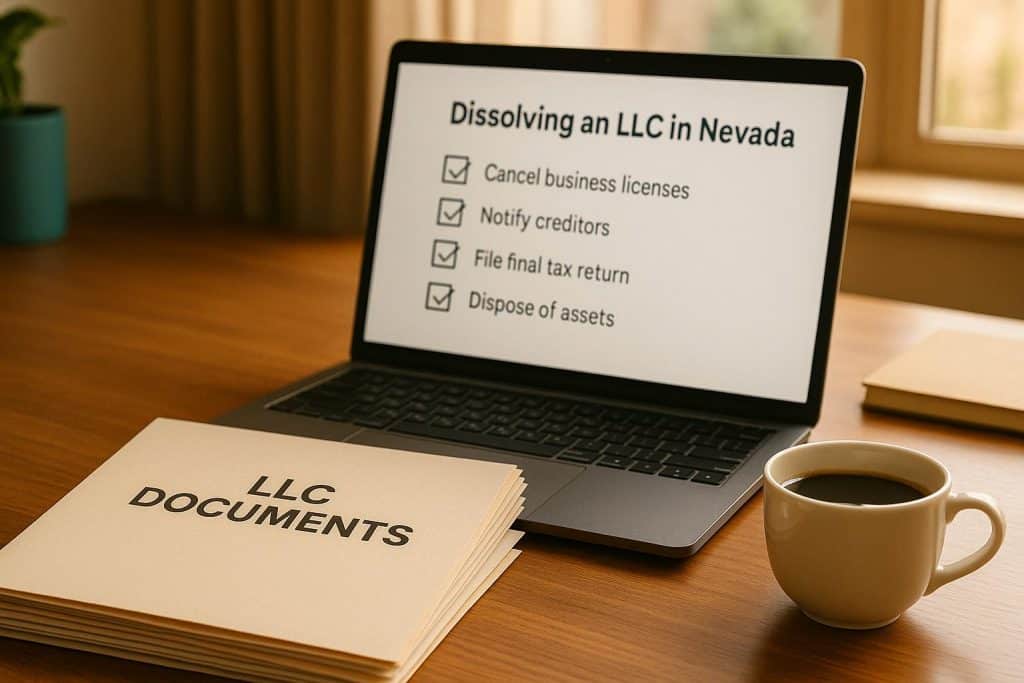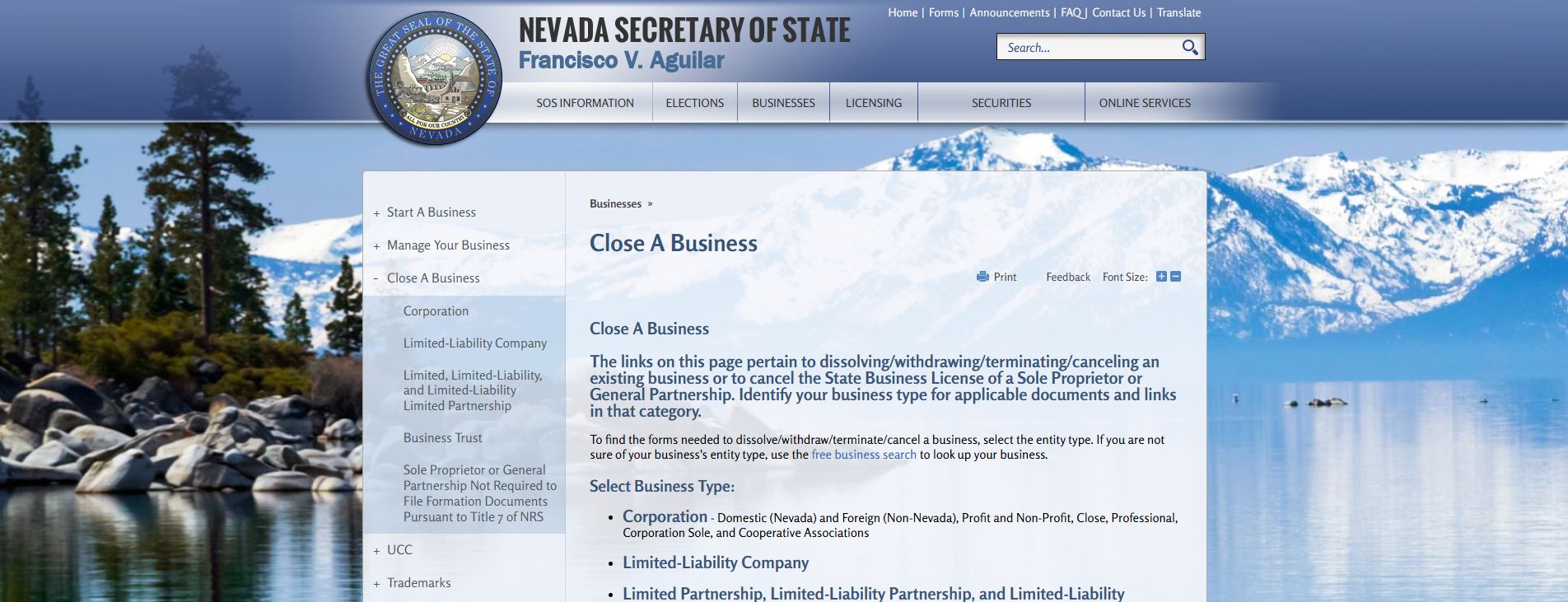Dissolving a Limited Liability Company (LLC) in Nevada is a formal process that involves multiple steps to ensure compliance with state laws and avoid future liabilities. Here’s a quick summary:
- File Articles of Dissolution: Submit the "Certificate of Dissolution/Cancellation Limited-Liability Company" form to the Nevada Secretary of State. Filing fees start at $100, with optional expedited services available.
- Settle Debts and Taxes: Pay off all outstanding debts, taxes, and other liabilities, including state taxes like Unemployment Insurance Tax and Sales Tax.
- Notify Creditors and Stakeholders: Inform creditors, landlords, vendors, and other parties about the dissolution, and provide a clear deadline for claims.
- Distribute Remaining Assets: Divide any remaining assets among LLC members based on the operating agreement.
- Close Tax Accounts: File final tax returns, mark them as "Final", and close all state and federal tax accounts, including your EIN and business licenses.
Why It Matters: Properly dissolving your LLC protects you from ongoing fees, penalties, lawsuits, and creditor claims. It also ensures a clean legal and financial break.
Quick Tip: Keep all dissolution records, such as meeting minutes, tax filings, and creditor notifications, for at least four years to avoid future issues.
Follow these steps carefully to close your LLC smoothly and avoid unnecessary complications.
Preparing to Dissolve Your LLC
Taking the right steps before dissolving your LLC is crucial to ensure compliance with state laws and to steer clear of potential legal or financial issues down the road. Here’s how to lay the groundwork for a smooth process.
Reviewing the Operating Agreement
Your LLC’s operating agreement is like a blueprint for the dissolution process. This document spells out the rules for voting, profit distribution, decision-making, and how to formally close the business. Pay close attention to sections that detail voting requirements, asset distribution, and the specific steps for dissolution. Key areas to review include:
- Basic company details
- Member roles and responsibilities
- Management structure
- Procedures for dissolving the LLC
If anything seems unclear or overly complex, it’s a good idea to consult an attorney or CPA. Sticking to the procedures in your operating agreement not only protects everyone’s interests but also helps avoid unnecessary disputes.
Getting Approval for Dissolution
Once you’ve reviewed the operating agreement, it’s time to get the green light from members. The approval process varies depending on your LLC’s structure and the rules laid out in the agreement.
- For single-member LLCs, formal voting isn’t usually required since the sole owner makes the decision.
- For multi-member LLCs, follow the voting requirements in the agreement – whether that’s unanimous consent, a two-thirds majority, or a simple majority. Be sure to document the vote in the meeting minutes.
Settling Outstanding Debts and Liabilities
After securing approval, the next step is tackling any financial obligations. Before officially dissolving the LLC, you’ll need to resolve debts, taxes, leases, and contracts. Start by creating a list of creditors, vendors, and anyone else the LLC owes money to.
Keep in mind that under Nevada law, creditors have up to two years to file claims against a dissolved LLC. Notify creditors of your intent to dissolve, provide a mailing address for claims, and set a deadline for submissions – typically 120 days from the notice date. Make it clear that claims submitted after the deadline will not be accepted.
When dealing with debts, consider these repayment options:
- Immediate payment
- Payment plans
- Negotiated settlements
If the financial situation is complicated or disputes seem likely, reach out to a Nevada-based business attorney or accountant who specializes in LLC dissolutions. Addressing these issues now helps shield you from future liabilities and ensures the dissolution process goes smoothly.
Filing the Articles of Dissolution
Once you’ve handled the preliminary steps, the next move is filing the necessary paperwork with the Nevada Secretary of State to officially close your LLC. This is an essential step in legally wrapping up your business.
Required Forms and Fees
To dissolve your LLC in Nevada, you’ll need to file the "Certificate of Dissolution/Cancellation Limited-Liability Company" form. The state charges a $3 processing fee, though additional costs apply for expedited services and certified copies.
| Processing Speed | Additional Fee | Total Cost | Timeline |
|---|---|---|---|
| Standard Processing | $0 | $100 | 5-10 business days |
| 24-Hour Processing | $125 | $225 | 1 business day |
| 2-Hour Processing | $500 | $600 | 2 hours |
| 1-Hour Processing | $1,000 | $1,100 | 1 hour |
If you need certified copies of your dissolution confirmation – for banks, creditors, or your records – each copy will cost an additional $30.
Filing Process and Documentation
After settling debts and obtaining necessary approvals, you’ll need to ensure your dissolution paperwork meets Nevada’s requirements. The form must include:
- The exact legal name of your LLC as it appears in state records.
- A statement confirming the LLC has been or will be dissolved.
- The effective date and time of dissolution, which must be within 90 days of filing.
A manager, member, or a personal representative (if you’re the sole member) must sign the form. Nevada provides several filing options: in person, by mail, or online through the Secretary of State’s website.
Make sure all details, especially the LLC name, are accurate to avoid delays. The state may also request proof of member approval for the dissolution, so keep your meeting minutes handy.
You can download the dissolution form from the Nevada Secretary of State’s website or request it via email. Once completed, submit the form with the appropriate filing fee.
Failing to file the Articles of Dissolution leaves your LLC active in Nevada’s records. This means you’ll still owe annual fees, taxes, and could face penalties – even if your business is no longer operating. Filing promptly and accurately ensures a clean break from your business obligations, sparing you from unnecessary headaches down the road.
Closing Financial and Legal Obligations
After filing your dissolution documents, you’ll need to take a few more steps to wrap up your LLC’s affairs and stay compliant with state and federal requirements.
Filing Final Tax Returns
Make sure to file all federal and state tax returns up to your shutdown date. Mark these as "Final" to indicate your business has officially ceased operations. Pay any outstanding taxes, including sales tax, payroll tax, or franchise tax, before closing.
You’ll also need to contact the Nevada Department of Taxation to cancel your state business license. If your LLC had employees, close your Modified Business Tax (MBT) account by calling the Employment Security Division (ESD) at 684-6300. Provide the date of your last payroll to close your Unemployment Insurance (UI) account. Once the UI account is closed, the MBT account will automatically close as well. While Nevada doesn’t require a formal tax clearance certificate for dissolution, it’s a smart idea to double-check that all tax accounts are clear.
Notifying Creditors and Stakeholders
Let your LLC’s creditors know about the dissolution by sending a formal written notice. Include details like where they can send claims, the information they need to provide, and a specific deadline for submitting claims. To cover unknown claimants, you might also publish a notice in a local newspaper.
Don’t forget to notify other parties impacted by the closure. This includes your registered agent, landlords, contractors, banks, and employees. Keeping everyone informed ensures an orderly process and helps avoid unnecessary complications.
Distributing Remaining Assets
Once all debts and obligations are settled, distribute any remaining assets according to your operating agreement. Nevada Revised Statute § 86.521 governs this process, and distributions should align with the ownership percentages outlined in your agreement. Use the correct IRS form – such as Form 990, 990-EZ, or e-Postcard (990-N) – based on your LLC’s size and receipts to report these distributions. Following the terms of your operating agreement precisely will help avoid disputes and keep the dissolution process legally compliant.
sbb-itb-ba0a4be
Post-Dissolution Best Practices
Once your business dissolution is finalized, following these best practices can help you avoid future compliance headaches. Remember, wrapping up your business doesn’t mean you can stop keeping records – proper retention is key to staying compliant and steering clear of legal troubles.
Maintaining Dissolution Records
Keep all key dissolution documents, such as Articles of Dissolution, meeting minutes, tax filings, and creditor notifications, securely stored. These records are essential for audits or any legal matters that might arise.
The IRS has specific retention guidelines you’ll need to follow. For example, property records should be kept until the applicable limitation period expires. This period refers to the amount of time you have to amend your tax return or for the IRS to assess additional taxes. When it comes to employment-related records, the rule is straightforward: hold onto all employment tax records for at least four years.
Make sure to retain all documentation related to taxes and asset distribution for the required time frame. This includes copies of final notices sent to creditors, banks, and other stakeholders, along with any responses you receive.
To stay organized, create a clear filing system that separates and labels all dissolution records. Use both physical and digital formats for added security. A strong record retention policy tailored to your business needs will help you identify what to keep and what can be safely discarded.
Finally, double-check that all registrations and tax accounts are closed. This includes your federal EIN and any business name registrations, such as DBAs, that are no longer needed. Properly closing these accounts ensures a clean break and prevents future complications.
Conclusion
Dissolving an LLC in Nevada involves a series of well-defined steps and a keen eye for detail to ensure compliance with state regulations. The process includes reviewing your operating agreement, securing member approval, settling outstanding debts, filing the Articles of Dissolution, addressing tax responsibilities, and informing all relevant parties.
Keeping detailed records throughout this process is crucial. These records can not only shield former LLC members from potential legal or financial liabilities down the road but also serve as valuable evidence if disputes arise. Additionally, they help reinforce the liability protections that an LLC provides.
Following each step with care is essential – missing even one requirement can lead to unnecessary complications later.
Taking a systematic approach ensures you can close your business confidently, free from lingering obligations. By putting in the effort now, you can avoid future legal and financial challenges while gaining peace of mind that your LLC dissolution complies fully with Nevada law. Use this guide to navigate the process with ease and precision.
FAQs
What happens if I don’t properly dissolve my LLC in Nevada?
If you don’t officially dissolve your LLC in Nevada, your business could still rack up obligations like taxes, fees, and penalties. Failing to take this step might also cause your LLC to lose its good standing status. This could make it harder to access courts, secure financing, or even operate within the state.
On top of that, your LLC might remain exposed to legal claims. Creditors, for example, can file claims against the company for up to two years after dissolution. By properly completing the dissolution process, you can steer clear of these risks and stay in line with Nevada’s legal requirements.
What steps should I take to properly close my tax accounts after dissolving an LLC in Nevada?
To wrap up your LLC’s tax responsibilities in Nevada, begin by filling out the Close Account Form with the Nevada Department of Taxation. This applies to sales, use, or commerce taxes tied to your business. Make sure all outstanding tax payments are settled, and submit your final tax returns to the relevant authorities.
Once that’s done, verify with the Nevada Department of Taxation that your accounts are officially closed. You may also want to request any required tax clearance documents as proof. These steps are crucial to ensure your LLC’s tax matters are completely resolved.
What can I do if LLC members disagree on how to distribute assets during dissolution?
If members of an LLC can’t agree on how to divide assets during dissolution, there are several ways to address the issue. Start by reviewing your LLC’s operating agreement. This document often includes guidelines for resolving disputes, including asset distribution procedures.
If the disagreement continues, consider turning to mediation or arbitration. These methods can help resolve conflicts faster and with less expense compared to a court battle.
When all else fails, judicial intervention may be necessary. A court can step in to ensure assets are distributed fairly. Typically, creditors are paid first, and any remaining assets are divided among members based on ownership percentages or the operating agreement’s terms. To streamline the process, make sure your financial records and agreements are organized and up to date before involving the legal system.









